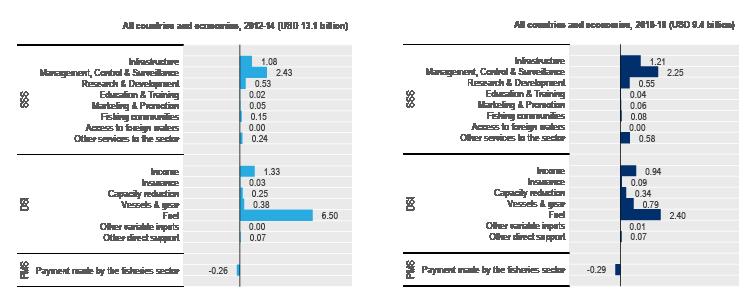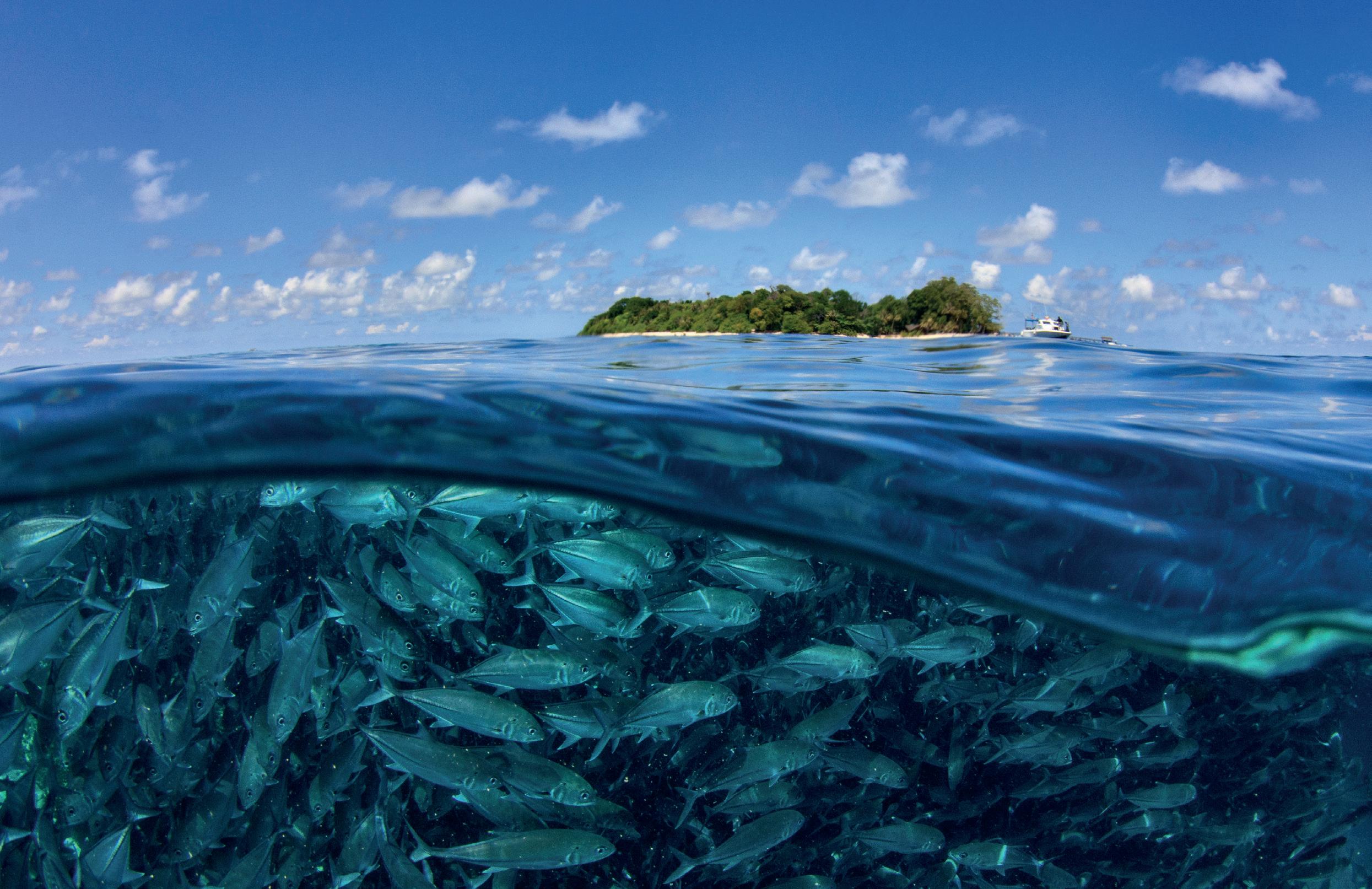
6 minute read
Sustainable and resilient fisheries and aquaculture
Better policies are needed to make fisheries and aquaculture production more sustainable and the millions of people who depend on them for food and jobs more resilient, particularly in the context of climate change.
Fisheries are fundamental to feeding the global population, and creating jobs and resilience in coastal communities. However, to achieve these socio-economic goals while preserving biodiversity and the provision of the ecosystem services on which the “blue economy” relies, fish stocks must be managed sustainably. Following the widespread expansion of aquaculture production – particularly in Asia – nearly 60 million people work in the sector today, almost twice as many as in the early 1990s. Over the last two decades, total seafood output value in the OECD has increased by about a third, predominantly driven by strong growth in the value of aquaculture. Over the same period, the volume of wild fish harvests fell by about 30% because of declining stocks and fishing policies aimed at exploiting them more sustainably.
However, climate change, overfishing and pollution are placing global fisheries under increasing pressure. Indeed, of the 1,119 stocks reported on in the OECD Review of Fisheries 2020, 254 (23%) were in an unacceptable status with regards to biological sustainability, calling for remedial action. Global fisheries could generate billions more in benefits if they were better managed. Governments are increasingly aware of the shortcomings of fisheries and aquaculture management frameworks, and that smarter regulations and new technologies are needed to improve sustainability and productivity. However, achieving reform in fisheries and aquaculture policy can be difficult, as a broad range of interests are at stake and it is often difficult and expensive to collect data on marine resources and ecosystems. Through the biannual Review of Fisheries, the OECD helps governments establish good policies and governance. This can help achieve environmentally sound fisheries and sustainable aquaculture that support resilient communities, provide quality food and secure livelihoods. Our work contributes to a more robust evidence base for policy making and promotes a dialogue among and between authorities in charge of fisheries and aquaculture policies in OECD member countries and beyond.
The OECD also produced more focused reports targeting fisheries policy reform. For example, Encouraging policy change for sustainable and resilient fisheries examines how to enable policy reforms in difficult contexts and find a successful pathway to reform through improved governance, stakeholder consultation, and mobilisation of scientific evidence and analysis.
Figure 14. Changes in government support to fisheries (FSE) disaggregated in its subcomponents

Note: SSS =Support for Services to the Sector; DSI = Direct support to individuals and companies in the fisheries sector; PMS = Payments made by the fisheries sector trend. Source: The OECD Review of Fisheries 2020
Government support for resilient and sustainable fisheries
Through the fisheries support estimate (FSE) database, the OECD measures and describes fisheries support policies in a consistent and transparent way across member countries and important non-member fishing economies. This database is a unique resource and is helping to inform negotiations on fisheries subsidies taking place at the World Trade Organization, monitor progress towards achieving the United Nations Sustainable Development Goal 14 and inform domestic policy discussions. The FSE database also provides a basis for users to investigate the impacts of fisheries support policies on resources and ecosystems as well as on jobs, incomes and value creation, with a view to adjusting policies to better deliver on the goals they were designed to meet.
Analytical work based on the FSE (Martini and Innes, 2018) suggests ways to better align the choice of support policies with stated objectives for the sector while minimising their impact on resources. To reduce negative impacts on the biological sustainability of fish resources and inequitable effects across fleet segments, governments should move away from policies that support inputs and towards those that help fishers operate their businesses more effectively and increase their profitability. The OECD Review of Fisheries 2020 suggests scope for reform is significant: from 2016-18, USD 3.2 billion was annually spent on policies that reduce the cost of inputs in the 39 countries and economies reporting to the FSE database. Support to fuel, alone, was the single largest direct support policy, accounting for 25% of total support to the sector. Conversely, less than a third of that amount (USD 1.0 billion) was granted in support that is partially de-coupled from fishing activities – such as income support and special insurance systems (Figure 14).
Implement strong frameworks to tackle illegal fishing
The recent report “Eliminating government support to illegal, unreported and unregulated fishing” (IUU) provides practical guidance for governments on how they can prevent their support policies from benefiting IUU fishing. These steps include: making support conditional on having a unique vessel identification and sharing detailed information on the beneficial owner; adopting a comprehensive yet practical definition of IUU fishing in national legislation; ensuing the process for withdrawing support is timely and sanctions are in proportion to the offense committed; and fully implementing existing mechanisms to exclude IUU fishing from markets, such as the Port State Measures Agreement.
Two additional OECD studies, “Closing gaps in national regulations against IUU fishing” and “Intensifying the fight against IUU fishing at the regional level”, help countries identify how to tackle IUU fishing. The reports investigate the extent to which governments meet have implemented laws and regulations to fight IUU fishing, and whether Regional Fisheries Management Organisations (RFMOs) use best practices to support their member countries fight IUU fishing. Results of these papers and a follow-up study in the Review of Fisheries 2020 show there has been considerable progress in improving regulatory frameworks and enforcing legislation over the last decade, but gaps remain (Figure 15). For example, in several countries, regulations and reporting requirements on fishingrelated activities, such as transhipment of catch between vessels, need to be strengthened to levels comparable to those fishing, while tougher sanctions should be applied to who do not abide by the law. At the regional level, RFMOs should publish more comprehensive lists of authorised and IUU fishing vessels and be better at recognising each other’s lists. RFMOSs should create strict and transparent sanctioning mechanisms for countries that fail to fulfil their obligations as RFMO members, and adopt catch documentation schemes that certify legal catches in a standardised way.
Figure 15. Uptake of best policies and practices against IUU fishing, 2018
International co-operation Vessel registration
1.0 0.9 0.8 0.7 0.6 0.5 0.4 0.3 0.2 0.1 0.0 Authorisation to operate in the EEZ
Port measures
All respondents (average) All respondents (max) All respondents (min) OECD countries (average) Emerging economies (average)
Note: Indicator scores range between 0 and 1, with increasing scores indicating higher levels of adoption and implementation of the measures covered by each indicator. A total of 33 countries and economies participated, including 26 OECD countries, as well as Argentina, the People’s Republic of China, Costa Rica, Indonesia, Chinese Taipei, Thailand and Viet Nam – together referred to as “emerging economies. Source: The OECD Review of Fisheries 2020
KEY PUBLICATIONS OECD (forthcoming), Eliminating government support to illegal, unreported and unregulated fishing, OECD Publishing, Paris
OECD (2020), OECD Review of Fisheries 2020, OECD Publishing, Paris, https://doi.org/10.1787/7946bc8a-en.
Delpeuch, C. and B. Hutniczak (2019), “Encouraging policy change for sustainable and resilient fisheries”, OECD Food, Agriculture and Fisheries Papers, No. 127, OECD Publishing, Paris, https://doi.org/10.1787/31f15060-en.
Hutniczak, B., C. Delpeuch and A. Leroy (2019a), “Closing Gaps in National Regulations Against IUU Fishing”, OECD Food, Agriculture and Fisheries Papers, No. 120, OECD Publishing, Paris, https://doi.org/10.1787/9b86ba08-en.
Hutniczak, B., C. Delpeuch and A. Leroy (2019b), “Intensifying the Fight Against IUU Fishing at the Regional Level”, OECD Food, Agriculture and Fisheries Papers, No. 121, OECD Publishing, Paris, https://doi.org/10.1787/b7b9f17d-en.
Martini, R. and J. Innes (2018), “Relative Effects of Fisheries Support Policies”, OECD Food, Agriculture and Fisheries Papers, No. 115, OECD Publishing, Paris, https://doi.org/10.1787/bd9b0dc3-en.
KEY WEBSITES http://oe.cd/fisheries-aquaculture https://stats.oecd.org/Index.aspx?datasetcode=FISH_FSE
CONTACT Claire Delpeuch – Claire.Delpeuch@oecd.org








